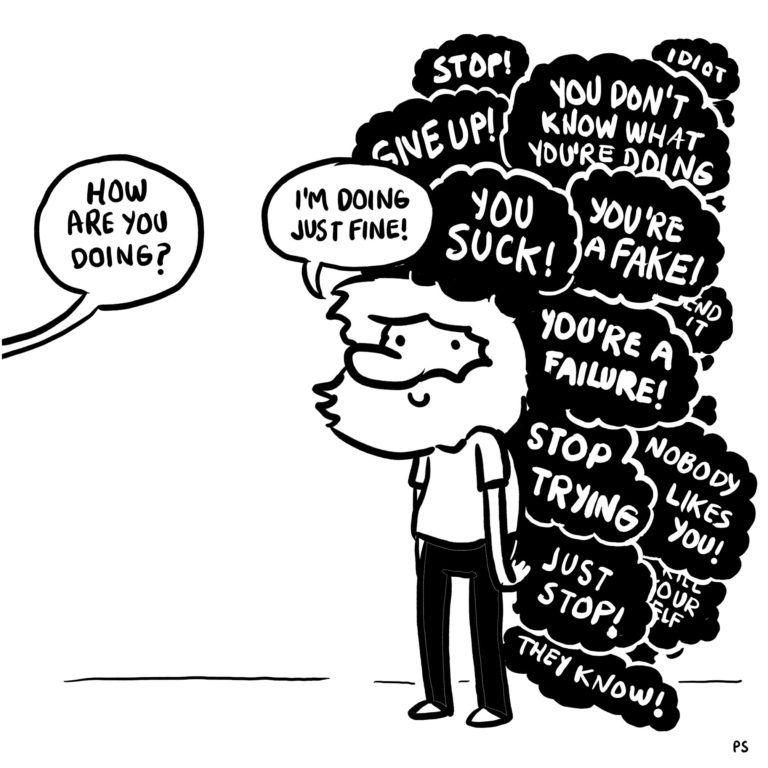Imposter syndrome at university is a relatively recent phenomenon, or maybe it’s only been recently noticed. Either way, there is a marked increase in students now suffering from imposter syndrome and there are a few theories as to why.

What is imposter syndrome?
First of all, imposter syndrome is a psychological phenomenon which is characterised by intense feelings of intellectual fraudulence. This often becomes obvious in people doubting their own accomplishments and feeling like a failure. Whenever there is a good result, such as a high pass on an exam, imposter syndrome means that these students feel like it was just a fluke or good luck on that day, rather than attributing it to working hard. The increase in anonymous surveys online means that there has been a greater admittance to imposter syndrome. Exploring why and how this affects students is an area that universities need to focus more on.
It has been shown that minority and female students are more likely to suffer from imposter syndrome and as Ore Ogunbiyi points out, this partly due to the curriculum. Showing students that who they identify with was only one specific part of history, such as the oppressed, rather than displaying all the views on that particular topic can lead them to believing that they don’t belong in that university where they are not represented. The curriculum should always be balanced and there needs to be a greater emphasis from those at university that subjects need broadening. However, instead of focusing on Margaret Thatcher, perhaps history could focus on Frantz Fanon as well. Showcasing different points of view and letting the institutional legacies be left behind.

Why has it become more prominent?
Using social media has been attributed to imposter syndrome. These two correlates because of the emphasis imposter syndrome has on perfectionism. On social media, the depiction of the perfect life is always there, people are wearing the latest bikini on a beautiful beach and having the craziest night out with loads of people. There is a pressure to live up to that and this is when imposter syndrome starts creeping in and the feeling that you don’t belong. However, social media is deceptive.The pictures that we are the most envious of are normally the ones that have been edited and altered to look better. There were probably loads of photos taken in which everyone had to pose a different way and smile just right, trust me, the natural more spur of the moment photograph is far more impressive.
Looking right doesn’t always equate to happiness and this is something that has to be learnt, it can’t be taught. Social media has taught us we all need to be perfect at all times, this is not the case and never ever will be. We are all our own individual and we should remember that when we feel a case of the wobbles.

Pluralistic ignorance
There is known to be something called “pluralistic ignorance”, we all doubt ourselves, but we do it privately, so we believe we are alone in our self-doubt and therefore alone in feeling like an imposter. But this also works both ways, we all work hard, some of us work exceptionally hard at one passionate idea, giving up everything else, others work hard at multiple things, giving their all to each individual project. However, we don’t notice the work that a person has put in because it is private and intense but then we see them progressing so much faster and easier than you are. This will lead to feelings of jealousy but then the imposter syndrome, why aren’t I doing that? Maybe I don’t belong here? All these little thoughts add up to feeling inadequate.
How to combat it
However, there are a few small actions that can lessen the feeling of imposter syndrome. Ensuring that you communicate will help you a lot. Talking to a friend, a classmate, even a lecturer will help to reassure you that you do belong there. It is also statistically likely that if you are feeling this specific way, then so will someone else. Imposter syndrome is not your private personal battle. It is influenced by your environment.

Imposter syndrome actually helps a student to be more productive. They feel like they don’t belong. They therefore begin to work very hard in hope of feeling a certain way. However, the likelihood is that you already work hard, and the syndrome is making it more stressful for you. In order to improve this, don’t stop working hard but have more breaks. Make time for a yoghurt or some yoga or even some Netflix. But maybe give social media a few more breaks.
There is no right way to be at all, you should always be proud of yourself and of what you’ve achieved. I know that when I look back, old me would not believe what I’m doing or how far I’ve come. So even though sometimes I feel like I don’t belong, I did the work to get here, only me and therefore I’m proud of where I am.
